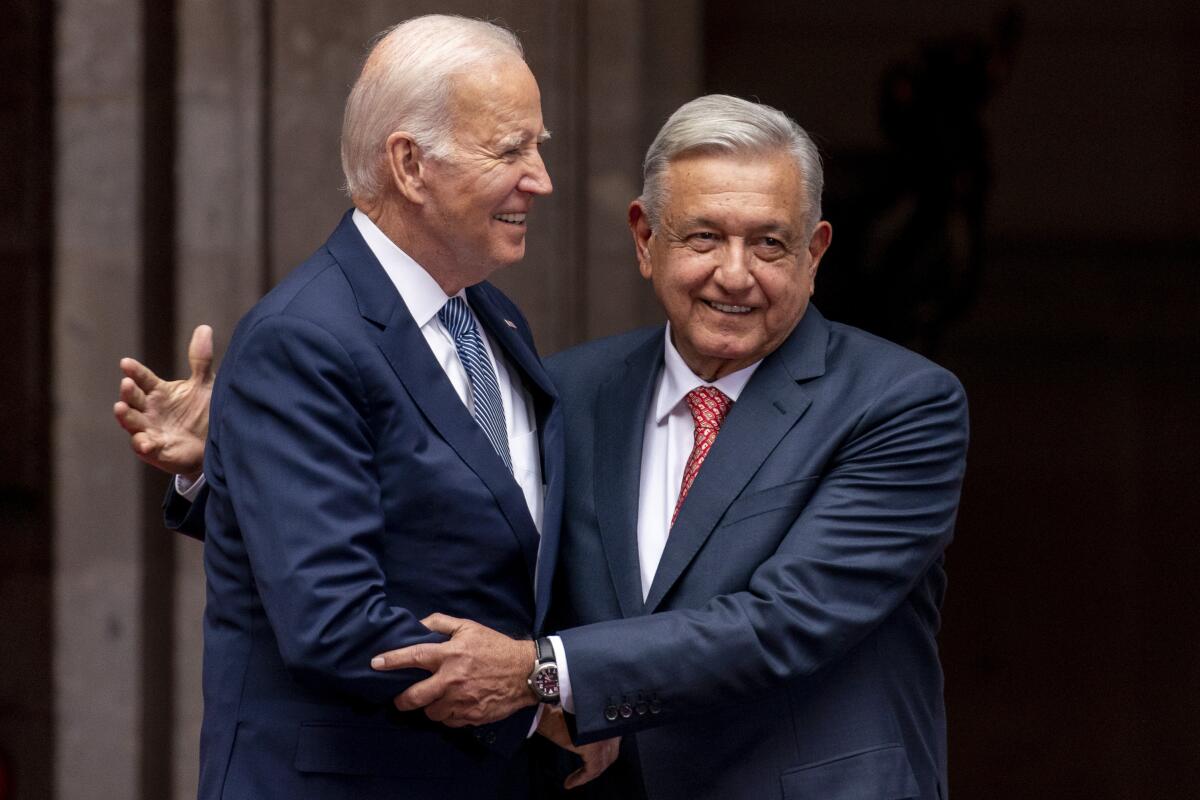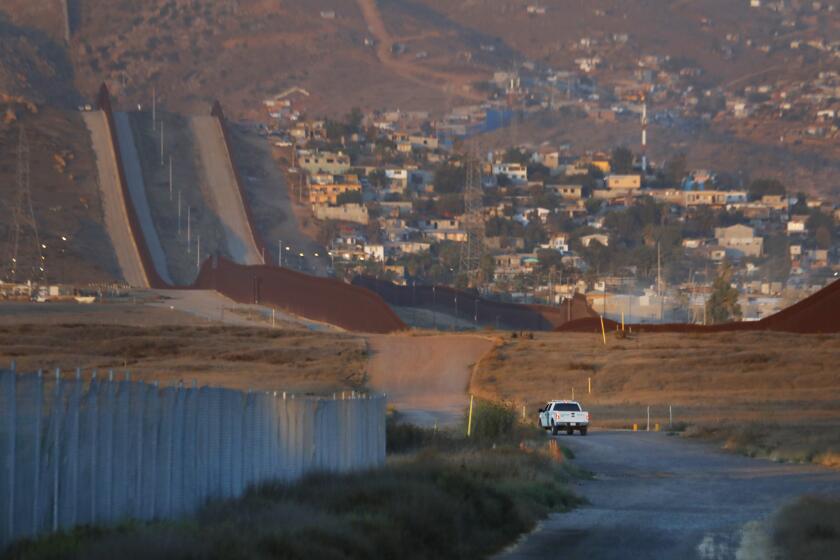Editorial: ‘Three Amigos’ summit over, the hard work of U.S., Mexico and Canada policymaking begins

- Share via
The three North American leaders met in Mexico City this week, pledging more cooperation on increased migration in the region, energy policies and trade disputes. It was a hefty agenda for the first visit to Mexico by a U.S. president since 2014, but the trip was an important effort to thaw an icy relationship with a key trading partner.
It’s a relief seeing the three leaders together at the North American Leaders’ Summit this week after nearly two years of politically fraught relations between President Biden and Mexican President Andrés Manuel López Obrador. The Mexican leader refused to acknowledge Biden’s election victory for about five weeks. Then last year, he boycotted the Summit of the Americas, hosted by the U.S., because Cuba, Nicaragua and Venezuela were not invited. However, leaders in the U.S. and Mexico warmly celebrated the 200th anniversary of diplomatic relations in December.
The “Three Amigos” summit, as this week’s meeting is informally called, helped cement the relationship among the U.S., Canada and Mexico at a critical time of rising economic and political instability in the Americas. Notably, Canadian Prime Minister Justin Trudeau, Biden and López Obrador issued a joint statement denouncing the anti-democratic attacks in Haiti.
The U.S.-Mexico border is a complex region not easily reduced to sound bites that sometimes turn out to be just myths — or convenient lies.
The three countries have been formal trading partners since the enactment of the North American Free Trade Agreement in 1994, creating an economic powerhouse that represents about one-third of the global GDP. The United States traded more than $3 million per minute in goods with Mexico and Canada in the first 10 months of 2022. The countries also share problems that are so immense they are best solved by working together.
Migration tops the list of concerns. Global migration is at its highest level ever, with almost 2.4 million migrants arriving at the U.S.-Mexico border in 2022. Biden faces increasing political pressure to secure the U.S.-Mexico border but also to treat migrants humanely. Last week, he announced the expansion of Title 42, a Trump-era health emergency order, to help control the border by deporting migrants. He also announced a U.S. work permit program for up to 30,000 migrants each month from Nicaragua, Haiti and Cuba, countries from which the majority of migrants are currently coming and which do not readily accept deportations.
The plan is dependent on Mexico agreeing to accept up to 30,000 migrants from those countries. This week, López Obrador said he may be willing to accept more. It’s an important concession, though the bilateral plan does not go far enough in solving the migration crisis for either country. The U.S. immigration system needs major overhaul to address the approximately 11 million undocumented immigrants in the country and provide a more humane, orderly system for border officials to process arriving migrants, among other things. In addition, the Mexican leader is pressing for legalization of undocumented Mexicans in the United States, which isn’t likely to happen in the foreseeable future due to political differences between Republicans and Democrats in addressing immigration issues.
Mexico is right to call out American gun makers for their role in fueling violence.
The three leaders also have shared concerns about the threat of fentanyl trafficking. Biden said authorities have seized 20,000 pounds of fentanyl at the border. And last week, the Mexican government arrested Ovidio Guzmán López, son of Joaquín “El Chapo” Guzmán Loera. It gave López Obrador authority to say Mexico is doing its part to combat drug trafficking.
Clearly, more work remains to be done. The three countries have yet to resolve trade disputes over energy policies. Trudeau and Biden are moving toward clean energy while López Obrador has clung to energy fueled by fossil fuels. If anything, this week’s summit may have convinced Mexico’s president that creating a “North American clean energy powerhouse” can be economically fruitful. Canada followed the United States in filing a complaint over Mexico’s policies that favor the state-owned electric company and state oil firm, PEMEX. It’s one of 17 trade disputes filed since the United States-Mexico-Canada Agreement replaced NAFTA in 2020.
Perhaps the most promising sign of this week’s meeting lies in the statements made by the three leaders that they want to create a North American regional supply chain that’s not dependent on other countries. During the pandemic, disruptions in the global supply chain of goods needed to manufacture products strained North American trade.
Of course, the U.S., Mexico and Canada have their own needs and interests — and political challenges. But the North American partnership is too important and presents too many valuable opportunities to be sidelined by frosty relations. The summit should be a reminder of how much the countries can accomplish together.
More to Read
A cure for the common opinion
Get thought-provoking perspectives with our weekly newsletter.
You may occasionally receive promotional content from the Los Angeles Times.












